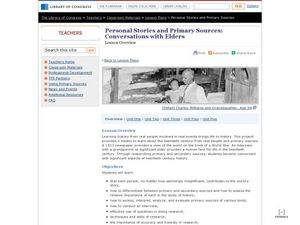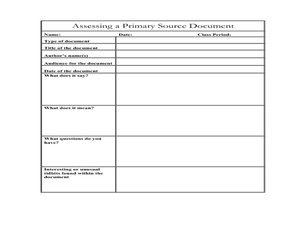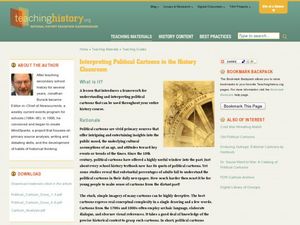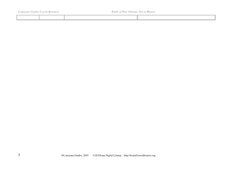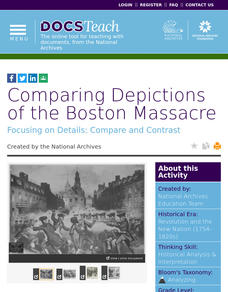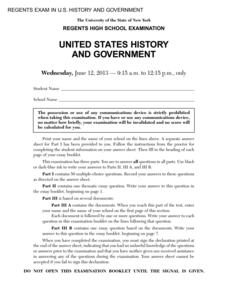Curated OER
Women in the Civil War: Ladies, Contraband and Spies
Learners interpret historical evidence presented in primary and secondary resources. For this American Civil War lesson, students research diaries, letters, and photographs of women involved in the war.
Curated OER
Personal Stories and Primary Sources: Conversations with Elders
Students learn from their elders. In this oral and social histories lesson, students analyze primary sources to develop an understanding of the America in which their grandparents grew up. Students conduct interviews with elders in...
Curated OER
Examining the Spanish Flu of 1918
Eighth graders take a closer look at the Spanish influenza breakout of 1918. For this research skills lesson, 8th graders examine primary sources gathered by their instructor and identify how communities prepared (or did not prepare for)...
Curated OER
America at the Centennial
Young scholars explore centennial America. For this American history lesson, students search the Library of Congress digital collections for primary sources regarding the lifestyles and values of Americans in 1876. Young scholars design...
Curated OER
The People of Kansas: Who Are They and Why Are They Here?
Students examine the settlement patterns of the Kansas Territory. In this Kansas history lesson, students analyze primary documents from the pioneers in the territory. Students write letters or perform skits that feature their findings.
Curated OER
Carter’s Approach to Facing the Energy Crisis
Students examine President Carter's stance on the energy crisis of the 1970s. In this energy crisis lesson, students analyze primary sources that feature the crisis during Carter's term. Students script and produce advertisements to...
Curated OER
Discover the Real Depression
Eleventh graders take a closer look at living conditions during the Great Depression. In this Great Depression lesson, 11th graders analyze primary source packets that their teachers prepare and then record facts about life for Americans...
Curated OER
What is to Become of the World After the War?
Students analyze primary sources regarding World War II. In this World War II lesson, students read "The Atlantic Charter," and respond to questions about the document.
Curated OER
Runaway Ad - Using Primary Documents
Young scholars examine a runaway slave advertisement. For this American history lesson, students investigate a missing slave advertisement run by Thomas Jefferson in 1769. Young scholars make inferences based on the advertisement.
Curated OER
The Mystery of History - Original Sources
Students examine and discuss the differences between primary and secondary sources. They brainstorm examples of each, locate examples of primary and secondary sources on the Internet, and identify three primary sources from home.
National Endowment for the Humanities
The Road to the Constitutional Convention
After defeating the most powerful nation in the world, the United States had to deal with its own weaknesses in the Articles of Confederation. Activities in the lesson include analyzing primary sources from the Founding Fathers to...
Curated OER
Interpreting Political Cartoons in the History Classroom
Students analyze political cartoons. For this historical perspectives lesson, students use the provided cartoon analysis worksheet to examine the political cartoons that their instructor shares with them.
Curated OER
Jobs in Jamestown
Students research occupations of Jamestown settlers using census data, and evaluate the data to show the needs and activities of the colony.
Curated OER
Using Photography to Time-Travel
Students view a series of films called "American Photography". They use primary source materials to place themselves in a historical period of their choice. They write an essay about the historical period.
DocsTeach
Reasons for Westward Expansion
"Go West, young man!" is a familiar refrain in American history. But why did people leave their homes in the East to travel westward and what impact did that movement have on people already living in the American West? By examining...
Curated OER
History Did Happen in My Back Yard!
Eighth graders interpret historical evidence presented in primary resources. In this Louisiana history lesson, 8th graders research their parish history using the LOUISiana Digital Library resources. Students create multimedia...
DocsTeach
Uncle Sam and the American Diet
Uncle Sam wants you to follow the food pyramid! Scholars analyze two images of propaganda posters the government created to promote the food pyramid. Academics complete a worksheet to understand the impact of the campaign and end the...
American Battle Monuments Commission
Liberating Rome: The Anzio and Rome-Arno Campaigns
Follow the liberation of Rome in both time and space with an interactive timeline and map. As class members click on various icons on the map, they can track different countries and their troops during the Anzio and Rome-Arno Campaigns...
DocsTeach
Comparing Depictions of the Boston Massacre
Academics compare images of the Boston Massacre to understand differing opinions of the event. Scholars view multiple images, participate in group discussion, and complete a series of written prompts. Young historians gain an...
DocsTeach
Analyzing a Child Labor Photograph
Sometimes images tell shocking stories. Individuals examine a Lewis Hines picture of children packing beans and consider the impact working in a factory had on their young lives. A series of prompts emailed to the teacher helps them...
New York State Education Department
US History and Government Examination: June 2013
How successful has American foreign policy been in the past? Pupils consider the question as part of a state examination in American history. Other prompts include a document analysis and essay of important civil rights cases decided by...
DocsTeach
Patent Analysis: Thomas Edison's Lightbulb
Watch lightbulbs go off in learners' heads as they look at a patent for Thomas Edison's most famous invention. After examining the light bulb patent, young historians speculate on how the invention changed life in the 1880s and its...
Museum of the American Revolution
Image Analysis: In Their Own Words
Images often convey more than words. Scholars examine political cartoons from the American Revolution to understand how images have the ability to express political ideas. Academics participate in group discussion, complete a worksheet,...
Museum of the American Revolution
George vs. George
It's George versus George in the battle for the American colonies. An interesting activity compares the leadership of George Washington and King George III during the American Revolution. Scholars read text, compare portraits, and...



